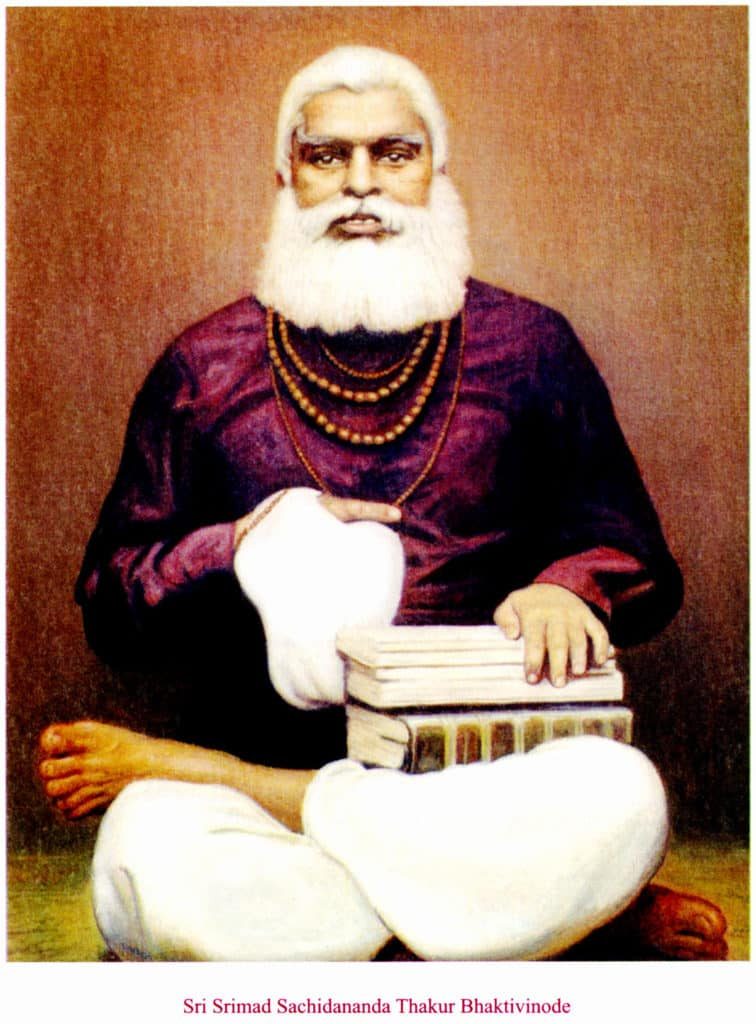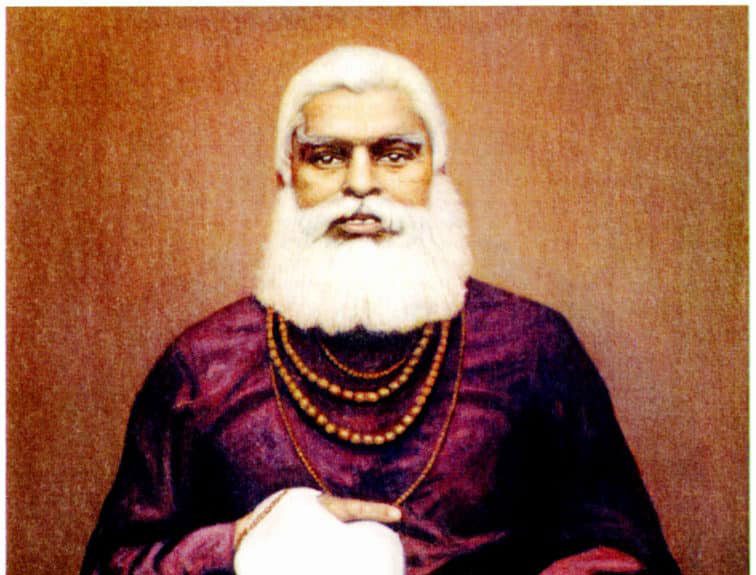Śrī Vaiṣṇavera Varṇāśrama (‘The Varṇāśrama of a Pure Vaiṣṉava’)
 by Śrīla Bhaktivinoda Ṭhākura (translated by Sanātana Dāsa)
by Śrīla Bhaktivinoda Ṭhākura (translated by Sanātana Dāsa)
The four varṇas of the Āryan people of Bhārata-varṣa are situated within four āśramas. These divisions of āśrama have originated with the divisions along with varṇa. Varṇa-dharma is preserved by being categorised by any one of the four āśramas namely, brahmacārī, gṛhastha, vānaprastha and bhikṣu. Those that possess a varṇa and have an identity, only need an āśrama. Varṇa-dharma and āśrama-dharma belong to the social order. Those who hope for some stability and benefit from social varṇa and āśrama have a duty to protect sanātana-dharma by following the ancient rules and prohibitions in all respects.
People within society have two kinds of inclinations, both of which are directed towards the welfare of society. Social Āryans have created rules, prohibitions, etc. for the purpose of preventing any kind of discord arising within society. Apart from fulfilling their principle purposes, all the rules and regulations that have been practiced also lead to the secondary aims of attaining Svarga and gaining puṇya etc. Those men who have an inclination towards karma follow rules given in śāstra pertaining to yajñas and other types of karma, offering tarpaṇa to the pitṛs, the practice of saṁskāras, vratas, residing in a holy place, bathing in sacred waters etc. And those who are inclined towards jñāna engage in the worship of the Devas and brāhmaṇas, offer respect to their elders, the cultivation of proper conduct to attain knowledge etc. and are focussed upon dharma and the śāstra. Amongst those with these two kinds of inclination, those who desire ātma–sukha (gratification for the self), brahmatva (to become Brahman) etc. in pursuing the four goals of life (dharma, artha, kāma and mokṣa), and act with the desire to attain them all, are at the forefront of society.
While remaining within society, the dry jñānī sampradāya consumes the food of the brāhmaṇas and in this way, they help fulfill the aim of society. The yogī sampradāya, by reducing their individual self-deprivation, makes the worldly jīvas aware that the attainment of happiness is possible in this way, and the propensity of attaining satisfaction from tyāga is increased. Philosophers from other sampradāyas, based upon their own methods, invite persons who are endeavoring for happiness, and upon obtaining happiness due to the result of such activities, they bestow auspiciousness to society.
Although a pure Vaiṣṇava’s conduct has some similarity with a person following varṇa-dharma, they do not consider it to be their aim to nourish society, nor to bestow auspiciousness upon it. They do not fill the sky of their hearts with such thoughts that by their actions, society will either be nourished or harmed. A pure Vaiṣṇava is never busy in establishing himself amongst the fourfold varṇas and fourfold āśramas. He feels no hesitation towards anybody whose activities crosses the boundaries of the regulations of varṇa, or does not respect the rules of āśrama. This is because all his activities are dedicated to the sole aim of increasing bhagavat-bhakti. A pure Vaiṣṇava does not feel pride or shame due to his being a brāhmaṇa, or a mleccha–caṇḍāla or being a gṛhastha or a bhikṣu. If a pure Vaiṣṇava attains hell or heaven in order to achieve bhagavat-bhakti, it is all the same. The prema which he has from attaining Bhagavān, or the prema from being in separation from Bhagavān is never reduced. A pure Vaiṣṇava does not hanker for anything. He has no scarcity of anything. Due to the deficiency of those who desire Brahman, they are enticed by the excellence of unachievable things. When they achieves that, the splendour of the form of Brahman which he always desired by them, becomes inferior. One who desires Brahman is constantly disturbed by the entanglements of māyā. A pure Vaiṣṇava is not agitated by that. Although the appearance and all the activities of a pure devotee seem to be similar to those who desire māyika results, factually they are very different.
Sometimes, considering pure Vaiṣṇavas and inferior Vaiṣṇavas to be the same, many people ask pure Vaiṣṇavas their varṇa, and just like those persons within society, they attempt to categorise them in one of the four āśramas. Such attempts are simply befitting a non-Vaiṣṇava and are merely a social endeavour. If one has darśana of the divine appearance pastimes of Śrī Gaurāṅga, who is the saviour of the fallen, and the world’s only Supreme Guru, then all doubts will be dispelled. In the Veda-śāstra of divine knowledge, it is written:
bhidyate hṛdaya-granthiś chidyante sarva-saṁśayāḥ
kṣīyante cāsya karmāṇi dṛṣṭa evātmanīśvare
(“The knot within the heart is pierced and all doubts are cut to pieces. One’s karma is destroyed when one sees the Lord as supreme.” – Śrīmad Bhāgavatam 1.2.21)
If we have darśana of the character of Bhagavān, then all our doubts are cut asunder. All our karma is destroyed, the knot of our heart is pierced and one realises the truth. Although a brāhmaṇa may have gone through the ten saṁskāras, be devoted to proper conduct, and have direct darśana of Brahman, he cannot become free from doubts unless he observes the divine character of Śrī Kṛṣna Caitanya, the supreme transcendentalist. Whoever has darśana of the supreme transcendental character of Śrī Caitanya knows that a pure devotee is not a brāhmaṇa, kṣatriya, vaiśya or śūdra, neither is he a brahmacārī, gṛhastha, vanaprastha or a bhikṣu. He is separate from all these and is the servant of the servant of Gopī-jana-vallabha. He has no other independent identity. Such māyika considerations that he is Brahman or aṇu (smallest of the smallest) never touch him. When he realises the nature of the temporary logic concerning ghaṭākāśa, mahākāśa, rajju-sarpa, pratibimba etc.* then these no longer have any necessity for him. I feel pained to mention the non-Vaiṣṇava conduct of some people nowadays who have given such abominable, contradictory meanings to the word ‘Śrī Vaiṣṇava” (pure devotee) in order to make them socially acceptable. They have merely tried to make themselves socially acceptable by polluting the form of the pure Vaiṣnavas by imposing temporary māyika identities upon them.
* Translator’s Note: Ghaṭākāśa and mahākāśa refers to analogy given by the māyāvādīs of the ‘sky within a pot’ (the jīva) and the ‘great sky’ (Brahman) – in other words, there is no difference between the sky encased within a pot and the great sky. Rajju-sarpa refers to the so-called logic of mistaking a rope to be a snake, inferring that the jīva erroneously considers himself to be individual when in fact he is Brahman. Pratibimba (reflection) refers to the māyāvāda concept that the jīvātmā is simply a reflection of Brahman.
Just some time after the closing of the divine pastimes of Śrī Śrī Gaurāṅga Deva, various communities such as the bāulas, sahajiyās, kartābhajās etc. as well as the smārtas, brāhmaṇas, and empiricists, in the guise of helping the pure Vaiṣṇavas, further tarnished their status. Still now there is no scarcity of those types of descendants. Gradually the population of such sections has further increaed. By trying to make Hari Dāsa Ṭhākura a brāhmaṇa, and trying to embelish Śrī Īśvara Purī as a śūdra or a brāhmaṇa by varṇa, the non-Vaiṣnava social aim is merely to establish the pure devotee’s incapacity or capacity to teach others based on whether he belongs to another varṇa apart from brāhmaṇa. All such aims have not helped in increasing bhakti, hence for the devotee Vaiṣṇavas, all such activities are not respected.
The pure devotee should always remember that he is the servant of the servant of Śrī Gopī-vallabha and he is never completely independent. Independence is not possible in him because by selling his independent propensity in the form of tadiyatva (accepting oneself as belonging to Kṛṣṇa), he has attained servitude to Kṛṣna. If all such considerations are awakened in the memory of a jīva who identifies as a Vaiṣṇava, yet the aforementioned prejudices become embedded in his heart, then his artificial independent propensity has been sold to Kṛṣna merely by cunningness. Factually his nature as tadiyatva has been sold to māyā, and becoming a servant of māyā, he becomes busily engaged in establishing himself. An artificial servant of Kṛṣna is situated far away from a pure Vaiṣṇava. Instead of the cultivation of prema-bhakti, he is merely extinguishing the temporary miseries arising from the cultivation of kāma (lust). Only for such categories of men, socially-oriented people have made arrangements for all these rules and prohibitions.
(Śrī Vaiṣṇavera Varṇāśrama – ‘The Varṇāśrama of a Pure Vaiṣṉava’, was first published in Sajjana Toṣaṇī, Vol. 11. Issue 10 in 1900, and translated into English by Sanātana Dāsa)
from https://bhaktivinodainstitute.org/sri-vaisnavera-varnasrama/

